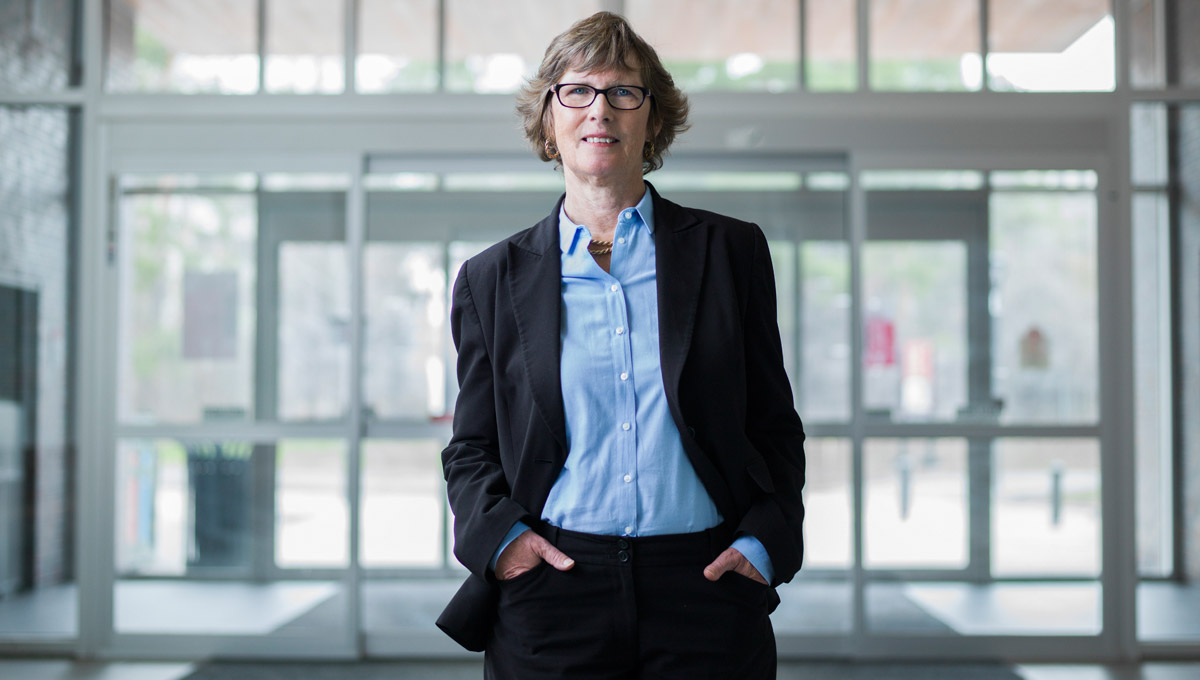By Elizabeth Howell
Photos by Chris Roussakis
Three cities across Canada – Toronto, Vancouver and Charlottetown – will benefit from an innovative program at Carleton University focused on creating sustainable infrastructure that protects the environment.
The program is called the Canadian Impact Infrastructure Exchange (CIIX), which is part of the Carleton Centre for Community Innovation. Funded projects include a sewage plant in Charlottetown that will use biogas to generate electricity (among other green measures), a Vancouver initiative to generate liquid natural gas from solid waste, and a storm water abatement project in Toronto that will include a storm water credit market.

Tessa Hebb, a Distinguished Research Fellow who’s leading the Canadian Impact Infrastructure Exchange (CIIX) program
CIIX has a key role in moving these projects forward. It just completed a sustainability analysis of the three proposals and has bundled each project into investment-ready opportunities for responsible investors. Funding to support the pilots has been procured from the Ivy Foundation, the Province of Ontario and the McConnell Foundation, with more sources being sought.
Tessa Hebb, a Distinguished Research Fellow who’s leading the project, said the conversation about responsible investment has radically changed since the early 1990s, when she was told that it was a niche thing that wasn’t going anywhere.
“Now, almost any day you pick up any newspaper and it’s all (about responsible) infrastructure,” she said.
“CIIX provides real-world experience for Carleton students working in these areas,” she added. “Our research assistants have taken on several major research projects within CIIX over the last few years, including writing briefing notes, background papers and case studies. In fact, last year’s summer student has had a chapter on investment in sustainable infrastructure accepted for publication.”

Bringing The Sustainable Infrastructure Vision to Canada
The initial spark for the pilot project came in 2012, when Hebb had an opportunity to collaborate with Impact Infrastructure to develop CIIX. (Today, Impact Infrastructure is one of the partner organizations in CIIX.) The company does cost-benefit analysis for sustainable buildings and green infrastructure, but is based in the United States. Hebb started investigating how to bring a similar vision to Canada.
In the fall of 2012, the predecessor department to Employment and Social Development Canada put out a call for innovative social finance programs. Hebb and John Williams, CEO and co-founder of Impact Infrastructure, submitted the idea for CIIX.
“It was my way of getting the message into the federal government at the time that they were not thinking on a large enough scale,” Hebb said.
While CIIX was one of the programs selected, she was told there was no money available. Hebb instead raised money from the McConnell Foundation, which helps Canadians work on complex social and economic challenges.
To determine the appetite for CIIX programs, Hebb held a symposium at Carleton in 2014 attended by 40 key participants to focus on sustainable infrastructure opportunities and ways to attract institutional investors.
“We did feel that was a logical first step, particularly for a university.”

Attracting Projects With Environmental and Social Considerations
In spring 2015, Hebb began fundraising for CIIX pilots, and approached several municipalities in Canada to see which would be interested and what was needed. The aim was to attract projects with high environmental and social considerations which required at least $50 million each in private investment.

To determine the appetite for CIIX programs, Hebb held a symposium at Carleton in 2014 attended by 40 key participants to focus on sustainable infrastructure opportunities and ways to attract institutional investors.
(After discussions with investors, CIIX will bundle the projects into an aggregated opportunity for $200 million to better approach the financial scale of projects in which institutional investors usually work.)
“Initially, many municipalities said the investors were only interested in the initial cost, and seeking to get that cost as low as possible,” Hebb said.
“But in 24 months, we’ve had this significant change going on. As you can see in Charlottetown, there’s much more of an awareness that funding is needed for the entire lifecycle of the project. Investors come in over the lifecycle of the investment opportunity and want to have high standards in ESG (environment, social and governance).”
Hebb added that CIIX is in line with many other institutions that are concentrating on responsible investing, along the lines of the United Nations Principles for Responsible Investment that aim to incorporate ESG principles in their work. She said that investors representing $60 trillion have signed on to the commitment, with more signatories coming each year.
“Carleton University has a deep expertise in responsible investing and has just wrapped up a six-year, $1-million SSHRC funded research partnership on responsible investing,” she added.
“We are bringing this expertise to CIIX.”
More information about CIIX is available here.

Thursday, May 11, 2017 in Environment and Sustainability, Innovation, Research
Share: Twitter, Facebook



